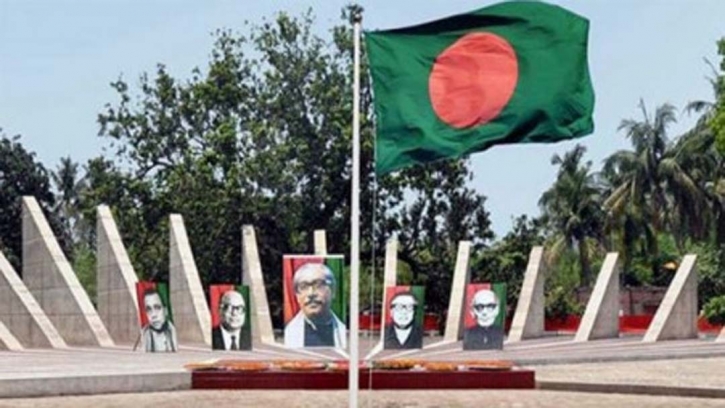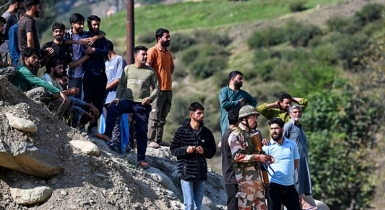
The formation of the Mujibnagar Government on April 17, 1971, carried great importance for the nation of Bangladesh. At this pivotal moment, elected assembly members commenced their legally mandated endeavour to establish a state.
Mujibnagar Day holds immense significance and warrants reverence and thorough scrutiny to prevent attempts to distort Bangladesh's struggle for independence. The citizens of post-colonial Bangladesh are responsible for continually showing gratitude towards the liberation fighters and pivotal organizers of the independence struggle. They exhibited unwavering commitment, reverence, and affection as they navigated the nation through the arduous fight. Despite the triumph of Bangabandhu Sheikh Mujibur Rahman in the 1970 general elections, the Pakistan Junta administration's obstinacy impeded the establishment of a government presided over by the populace. Bangladesh's inaugural democratically elected administration, the Mujibnagar Government, was created on April 17, 1971. The members of the Constituent Assembly diligently executed their constitutional duties on this momentous occasion, propelling Bangladesh towards its esteemed condition of freedom. The observance of Mujibnagar Day on April 17 signifies a momentous milestone in Bangladesh's quest for independence. The Baidyanathtala mango orchard in Meherpur, initially a section of the Kushtia district, assumed the primary administrative centre for the Mujibnagar government after the proclamation of independence on April 10. The site above garnered the attention of many international journalists who congregated to witness the solemnization ritual and commemorate the establishment of a novel state.
While Bangabandhu was not physically there, his leadership profoundly and deeply influenced the unfolding events. In the absence of Bangabandhu Sheikh Mujibur Rahman, Syed Nazrul Islam assumed the role of interim president, while Tajuddin Ahmed accepted the position of interim Prime Minister of Bangladesh. The government consisted of M. Mansur Ali as the Finance Minister, A. H. M. Kamaruzaman as the Minister of Home, Relief, and Rehabilitation, and Khondakar Mostaq Ahmed as the Minister of Foreign Affairs and Law. General M. A. G. Osmani accepted the role of Commander-in-Chief of the military forces of Bangladesh following his prior service as a Colonel and Member of the National Assembly (MNA) representing the Awami League.

The government of Mujibnagar undertook the crucial task of coordinating civil administration and liberation fighters, procuring weaponry and providing training, coordinating diplomatic efforts to secure international support for the Independence war, and ensuring timely relief during the complex and demanding period. The utilization of effective communication and adept coordination by the Mujibnagar government significantly bolstered the morale of a multitude of liberation warriors, leading to an unprecedented surge in their resolve.
In the absence of our leader, Bangabandhu Sheikh Mujibur Rahman, his deputies assumed leadership roles, exhibiting exceptional courage and commitment. They guaranteed the perpetuation of our nation's military confrontation for an extra eight months, preserving the unity of our country, a crucial factor in our fight for independence. They courageously faced all challenges, unwaveringly upholding the heritage of Bangabandhu, our honoured leader. The establishment of the April 17 administration invigorated our war endeavour, fostering a deep sense of national pride among the populace of Bangladesh, who acknowledged their nation's undeserved position within the global community despite the devastating consequences of armed conflict.
The formal statement made on April 17, 1971, signified the establishment of a new administration as the nation embarked on its journey towards self-governance. The events of that day, occurring within a framework that would fundamentally alter our political history, once again confirmed Bangabandhu Sheikh Mujibur Rahman's status as the foremost figure in our pursuit of constitutional legitimacy and triumph in warfare. Bangabandhu, in line with his predecessors, abstained from embracing revolution or political terrorism as a strategy to achieve his objectives. Recognizing the immediate danger presented by Pakistan's military, he cautioned his associates about the unavoidable nature of a prolonged struggle. Bangabandhu bravely proclaimed independence before his apprehension by Pakistani forces, mobilizing his followers to oppose, exemplifying his visionary leadership and adept guiding.
Before Pakistan's military incursion, Bangabandhu clandestinely instructed the high-ranking officials of the Awami League to leave Dhaka. Hence, the formation of the Mujibnagar administration by Bangabandhu's faithful supporters was constitutionally legitimate and logically and practically justified. Furthermore, the absence of a centralized governing body likely led to the extensive proliferation of insurgent factions nationwide. The establishment of the Mujibnagar government played a crucial role in mitigating the emergence of a fragmented independence movement that included nationalist factions. The visit made by Acting President Syed Nazrul Islam and Prime Minister Tajuddin Ahmed to Meherpur in April 1971 was a significant demonstration of the resolute commitment of elected authorities in Bangladesh to establish an independent state for the nation's populace.
The international community acknowledged the accountability of the Mujibnagar Government. The resolute support of the campaign leaders from the general public effectively prevented any dismissal of the nation's struggle for liberation as a mere insurgency or separatist movement. Moreover, the military's flawed evaluation of countering Bengali political aspirations inadvertently bolstered the movement. Amidst the circumstances above, instances of violence targeting women and defenceless individuals were perpetrated to undermine the dictatorship, hence bolstering the endeavours of the interim government. The substantial influx of millions of Bengalis to India from March to December 1971 underscored the urgent and legitimate nature of the Bengali movement, affirming the absolute necessity for an independent Bangladesh. Under the leadership of the Mujibnagar Government, the administration effectively secured international backing by highlighting Bangladesh's commitment to democratic, nationalist, secular, and socialist principles with the aid of Bengali diplomats and notable figures like Justice Abu Sayeed Chowdhury.
The inception of the Mujibnagar government marked the rise of a progressive democratic nation rooted in the collective aspirations of the Bengali population. Dr. Tawfiq-e-Elahi Chowdhury BB, a senior figure in the coordination of the Mujibnagar celebration, considered it a momentous occasion in the chronicles of national history, imbuing the pursuit of liberation with renewed energy and heightened credibility. Mr Mahbubuddin Ahmed, BB, articulated comparable perspectives, emphasizing the significance of safeguarding the integrity of Bangladesh's struggle for independence against any endeavours to alter its historical account. The dedication and unity, reminiscent of the events in 1971, remain essential in the current conditions.
The government of Mujibnagar consciously endeavoured to secure international aid to bolster Bangladesh's global prominence. Through strategic planning and efficient coordination, the group successfully mobilized popular sentiment in endorsing the independence of Bangladesh, ultimately achieving victory over the Pakistani military. The smooth and successful outcome of the Bangladesh independence movement can be attributed to the collaborative efforts of the Mujibnagar government. After her term, Prime Minister Jononetree Sheikh Hasina has dedicated herself to establishing a prosperous and self-reliant Bangladesh, aiming to actualize Bangabandhu's vision of Sonar Bangla. The observance of Mujibnagar Day holds the potential to serve as a lasting symbol of unity, solidarity, and self-governance among the citizens of Bangladesh.
Honourable Prime Minister Jononetree Sheikh Hasina exemplifies a steadfast commitment to upholding the admired heritage of Mujibnagar Day, encapsulating the profound essence of Bangladesh's battle for liberation. The individual in question demonstrates visionary leadership by skillfully organizing commemoration events and activities designed to pay tribute to the courageous individuals who played a crucial role in the nation's struggle for independence.
Prime Minister Hasina skillfully organizes celebrations and delivers eloquent speeches to the people, ensuring that the sacrifices made during the turbulent days of Mujibnagar have a lasting impact on history. The individual in question formulates policies and activities that not only preserve the honour of Mujibnagar Day but also reinforce Bangladesh's dedication to the ideas of democracy, equality, and justice, which were advocated by the nation's founding individuals.
Prime Minister Hasina demonstrates firm dedication to preserving the honour of Mujibnagar Day. She promotes a sense of national cohesion and solidarity, surpassing temporal and spatial limitations to ensure that the sacrifices made in the past function as the persuading directions for existing and forthcoming years. With her determined will and exceptional leadership skills, she ensures that the passion that was kindled in Mujibnagar remains strong, guiding the way towards a prosperous, inclusive, and dignified Bangladesh.
Joy Bangla Joy Bangabandhu
Author is a Columist, Writer, Academic, Folklorist, Professor of English, Islamic University, Kushtia, Bangladesh





































